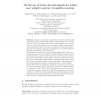Free Online Productivity Tools
i2Speak
i2Symbol
i2OCR
iTex2Img
iWeb2Print
iWeb2Shot
i2Type
iPdf2Split
iPdf2Merge
i2Bopomofo
i2Arabic
i2Style
i2Image
i2PDF
iLatex2Rtf
Sci2ools
110
click to vote
PERVASIVE
2010
Springer
2010
Springer
On the Use of Brain Decoded Signals for Online User Adaptive Gesture Recognition Systems
Activity and context recognition in pervasive and wearable computing ought to continuously adapt to changes typical of open-ended scenarios, such as changing users, sensor characteristics, user expectations, or user motor patterns due to learning or aging. System performance inherently relates to the user’s perception of the system behavior. Thus, the user should be guiding the adaptation process. This should be automatic, transparent, and unconscious. We capitalize on advances in electroencephalography (EEG) signal processing that allow for error related potentials (ErrP) recognition. ErrP are emitted when a human observes an unexpected behavior in a system. We propose and evaluate a hand gesture recognition system from wearable motion sensors that adapts online by taking advantage of ErrP. Thus the gesture recognition system becomes self-aware of its performance, and can self-improve through re-occurring detection of ErrP signals. Results show that our adaptation technique can impr...
Applied Computing | ErrP Recognition | Gesture Recognition | Hand Gesture Recognition | PERVASIVE 2010 |
Related Content
| Added | 28 May 2010 |
| Updated | 28 May 2010 |
| Type | Conference |
| Year | 2010 |
| Where | PERVASIVE |
| Authors | Kilian Förster, Andrea Biasiucci, Ricardo Chavarriaga, José del R. Millán, Daniel Roggen, Gerhard Tröster |
Comments (0)

